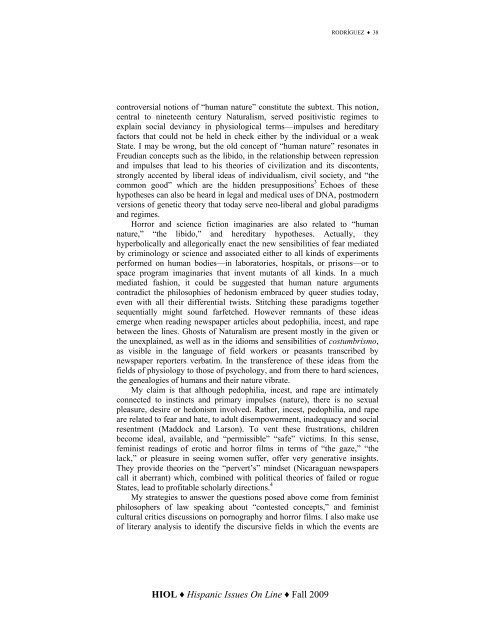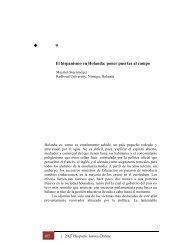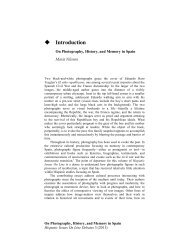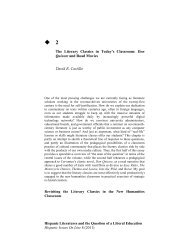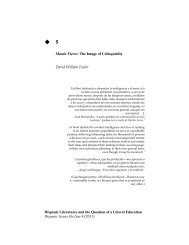Human Rights/Sexual Desires: Incest/Pedophilia/Rape
Human Rights/Sexual Desires: Incest/Pedophilia/Rape
Human Rights/Sexual Desires: Incest/Pedophilia/Rape
Create successful ePaper yourself
Turn your PDF publications into a flip-book with our unique Google optimized e-Paper software.
RODRÍGUEZ ♦ 38<br />
controversial notions of “human nature” constitute the subtext. This notion,<br />
central to nineteenth century Naturalism, served positivistic regimes to<br />
explain social deviancy in physiological terms—impulses and hereditary<br />
factors that could not be held in check either by the individual or a weak<br />
State. I may be wrong, but the old concept of “human nature” resonates in<br />
Freudian concepts such as the libido, in the relationship between repression<br />
and impulses that lead to his theories of civilization and its discontents,<br />
strongly accented by liberal ideas of individualism, civil society, and “the<br />
common good” which are the hidden presuppositions 3 Echoes of these<br />
hypotheses can also be heard in legal and medical uses of DNA, postmodern<br />
versions of genetic theory that today serve neo-liberal and global paradigms<br />
and regimes.<br />
Horror and science fiction imaginaries are also related to “human<br />
nature,” “the libido,” and hereditary hypotheses. Actually, they<br />
hyperbolically and allegorically enact the new sensibilities of fear mediated<br />
by criminology or science and associated either to all kinds of experiments<br />
performed on human bodies—in laboratories, hospitals, or prisons—or to<br />
space program imaginaries that invent mutants of all kinds. In a much<br />
mediated fashion, it could be suggested that human nature arguments<br />
contradict the philosophies of hedonism embraced by queer studies today,<br />
even with all their differential twists. Stitching these paradigms together<br />
sequentially might sound farfetched. However remnants of these ideas<br />
emerge when reading newspaper articles about pedophilia, incest, and rape<br />
between the lines. Ghosts of Naturalism are present mostly in the given or<br />
the unexplained, as well as in the idioms and sensibilities of costumbrismo,<br />
as visible in the language of field workers or peasants transcribed by<br />
newspaper reporters verbatim. In the transference of these ideas from the<br />
fields of physiology to those of psychology, and from there to hard sciences,<br />
the genealogies of humans and their nature vibrate.<br />
My claim is that although pedophilia, incest, and rape are intimately<br />
connected to instincts and primary impulses (nature), there is no sexual<br />
pleasure, desire or hedonism involved. Rather, incest, pedophilia, and rape<br />
are related to fear and hate, to adult disempowerment, inadequacy and social<br />
resentment (Maddock and Larson). To vent these frustrations, children<br />
become ideal, available, and “permissible” “safe” victims. In this sense,<br />
feminist readings of erotic and horror films in terms of “the gaze,” “the<br />
lack,” or pleasure in seeing women suffer, offer very generative insights.<br />
They provide theories on the “pervert’s” mindset (Nicaraguan newspapers<br />
call it aberrant) which, combined with political theories of failed or rogue<br />
States, lead to profitable scholarly directions. 4D<br />
My strategies to answer the questions posed above come from feminist<br />
philosophers of law speaking about “contested concepts,” and feminist<br />
cultural critics discussions on pornography and horror films. I also make use<br />
of literary analysis to identify the discursive fields in which the events are<br />
HIOL ♦ Hispanic Issues On Line ♦ Fall 2009


